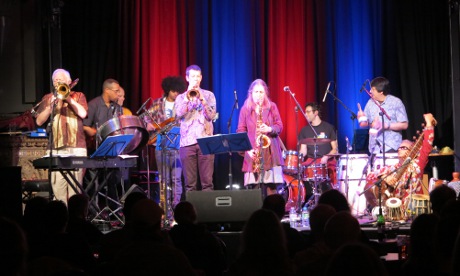
Authenticity is difficult to de fine and express “but you know it when you experience it”, writes Tony Haynes, composer and artistic director of Grand Union Orchestra.
This and the concept of ‘artistic truth’ are clearly important to the 71-year old, who founded the world jazz orchestra, known for its spectacular large-scale shows, in 1982.
Anyone who has seen the orchestra perform may agree, the variety of cultures and styles represented through its members giving it an incredibly broad emotional range, which is borne out of individual musicians’ experiences as well as the freedom Haynes gives them to
improvise.
“I don’t believe in that autocratic notion of composer,” he says. “ If I have a steel band, an Indian ensemble, some African drummers and a community choir then I have to treat them as material. Improvisation of all kinds is absolutely essential to that process.”
Haynes, who is classically trained and has experience working in theatre, is infl uenced by Brecht in his belief that an audience needs to feel that performers have actually lived what they are playing.
Considering the genuinely internationalist nature of the orchestra (it’s no overstatement to suggest few nationalities or world musics have not at some stage been involved) this seems a powerful philosophy.
“When you have people who quite clearly have come out of the coup in Chile” he explains, “when they sing about those things it has an immense immediacy.”
But there’s no better place, says Haynes, to base the orchestra than in East London and its current Bethnal Green home.
“ The history of East London feeds into the work, particularly as the concerns we all pick up on are about migration, exile and the movements of people and mixtures of cultures.”
In a series of events called On The Edge at Wilton’s Music Hall this month, the orchestra will be celebrating the ‘musical melting pot’
of East London by bringing together musicians and singers from every major musical culture worldwide, including virtuoso players and great improvisers.
For four days audiences will have the chance to listen, dance and play music with them. Explaining the title, he says: “ There’s a literal edge because we’re on the edge of the city and there is a sense of precariousness in that economically.
“But also as musicians we are living on the edge because we put ourselves out to express things that are unfashionable or unspoken, and especially because we are prepared to improvise.
“It appeals to me because there’s this sense of danger – and we do court danger. We don’t play safe really.”
Grand Union Orchestra play at Wilton’s Music Hall, 1 Graces Alley, E1 8JB from 21-24 November
